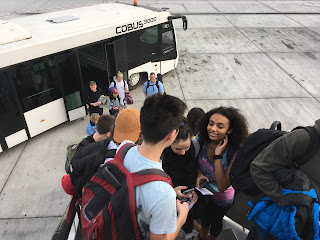February 10, 2018
We have
now been traveling to Cape Town for twenty five hours, from the time our plane
left the tarmac at SeaTac. After a luxurious eleven hour layover at an airport
hotel in Dubai, we are soon going to take our second leg to South Africa.
Students
are better rested than they were at this point last year, largely having slept
on the plane and then again here at the hotel, where I’m currently writing
things up in a lobby, soon to board with everyone on a shuttle back to the
airport. Their energy was a little scary to us adults, because well rested
teens on a dozen hour layover in Dubai could be trouble; but these students
have been terrific so far—reliable, respectful, cheerful and ready. Hopefully
they have enough sleep and rest banked for what’s soon to come.
This is
such an extraordinary trip, and I’m amazed Roosevelt has been able to make it
so well and for so long. Students and teachers and my own daughter (HFB 2016)
have had life-changing experiences reliably and repeatedly. This year there’s
the added experience of an international news making drought in Cape Town and
its impending Day Zero—the moment Cape Town runs out of water, a couple weeks
before the rainy season, and the region needs to employ armed militia to
contain the panic.
Getting
students out of their world and into one where reality and history and race are
painted so differently is important—for the enrichment of souls and for their
humility as citizens. This morning I was listening to the podcast, Hidden
Brain, focused on the relationship between language, thought and action: what
we think is natural and true is just what we’ve locally been taught. In this
case, Shankar Vidantam was interviewing a linguist, who discussed how time was
framed by how we view space, which is determined in part by how we read—we look
to the left in the West; she also discussed how language and its gendering of
objects alters how we view things existing in the world—bridges elegant and
beautiful when female, strong and enduring when male—and how our very gender
identities are affected when language demands recognition of what person is
male and what is female in nearly every sentence (children in Finland take a
year longer to know their own gender, because Finnish uses unisex pronouns);
and she also talked about how verbs in English were most frequently active such
that we always know who commits an act but not always, as with other languages,
whether or not the act is an accident. What is transmuted by a click language
like Xhosa? What will we feel but not quite understand, as we interact with
Xhosa and Afrikaners in Cape Town? What will we discover of ourselves? What
will we understand about the way we perceive and deal with race?










No comments:
Post a Comment